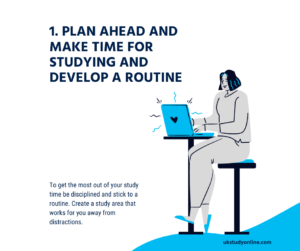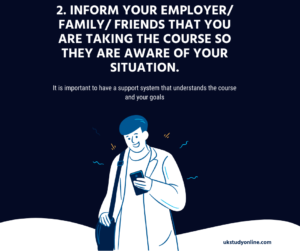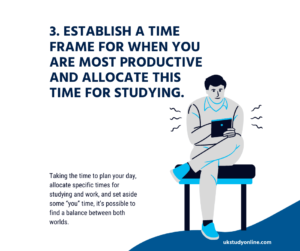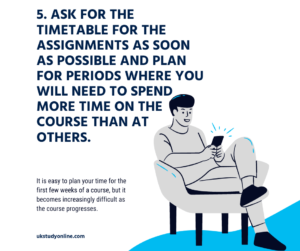Studying and working full time
In today’s environment, many individuals are seeking a new career or career advancement. With the ever-changing job market and modern communication tools, it is now easy to complete an online course from anywhere in the world. Covid pushed businesses to adapt rapidly to remote working and online collaboration, this gave many people first-hand experience of working and collaborating fully online. While this was a seismic shift for businesses and employers, universities have been using the very same tools and more in delivering online undergraduate and postgraduate classes for over a decade.A new normal
 Many people have found their commute time is half what it used to be, and are beginning to think about what they want to achieve in the future.
60% of the individuals surveyed in a poll by Aviva said they were not satisfied with their current job and planned changes such as switching careers, learning new skills or finding a new role within their existing organisation.
Gaining new skills or a university qualification on a part-time basis is now the logical next step for many. The tips below are just as relevant if you study full-time and have a part-time job.
Many people have found their commute time is half what it used to be, and are beginning to think about what they want to achieve in the future.
60% of the individuals surveyed in a poll by Aviva said they were not satisfied with their current job and planned changes such as switching careers, learning new skills or finding a new role within their existing organisation.
Gaining new skills or a university qualification on a part-time basis is now the logical next step for many. The tips below are just as relevant if you study full-time and have a part-time job.
Can you study while staying in full-time employment?
If you are thinking of studying part-time, there are a few things to consider when balancing your work and other life commitments. We have listed 5 tips and have updated this article with extra top tips to help develop productivity skills and balance work and study.Here are 5 tips that will help you manage your studies while maintaining your day-to-day life
1. Plan ahead and make time for studying and develop a routine
 If you have limited time to study, you must plan so that you can maximise your available time to complete your coursework. To get the most out of your study time be disciplined and stick to a routine.
If you have limited time to study, you must plan so that you can maximise your available time to complete your coursework. To get the most out of your study time be disciplined and stick to a routine.
2. Inform your employer/ family/ friends that you are taking the course so they are aware of your situation
 Taking an online degree can be a difficult task. It is important to have a support system that understands the course and your situation. A support system can include family, friends, or employers.
It is always good to inform these people about what you are doing so they know where you are coming from and how best to help you out during your course. They will understand when you need to commit time to study and when you need to get some air. They will also understand when you are on a high and in the mood for celebrating with them!
Taking an online degree can be a difficult task. It is important to have a support system that understands the course and your situation. A support system can include family, friends, or employers.
It is always good to inform these people about what you are doing so they know where you are coming from and how best to help you out during your course. They will understand when you need to commit time to study and when you need to get some air. They will also understand when you are on a high and in the mood for celebrating with them!
3. Establish a time frame for when you are most productive and allocate this time for studying
 The amount of time you have to study is very much dependent on your work and family commitments. By taking the time to plan your day, allocate specific times for studying and work, and set aside some “you” time, it’s possible to find a balance between both worlds.
To help give you an idea of how much free time there is in your day, take a look at this example:
8 hours of sleep-time + 8 hours work-time = 16 hours. This gives you 8 hours for everything else. This means you need to be realistic about the study you can get done in the morning or evening around work. Understand when you are the most productive, some people are best in the morning and some are night owls.
It is best to plan your workdays based on this knowledge so you can maximize the time you have. Most people studying whilst working full-time complement shorter periods of study in the week with longer study sessions at the weekend.
The amount of time you have to study is very much dependent on your work and family commitments. By taking the time to plan your day, allocate specific times for studying and work, and set aside some “you” time, it’s possible to find a balance between both worlds.
To help give you an idea of how much free time there is in your day, take a look at this example:
8 hours of sleep-time + 8 hours work-time = 16 hours. This gives you 8 hours for everything else. This means you need to be realistic about the study you can get done in the morning or evening around work. Understand when you are the most productive, some people are best in the morning and some are night owls.
It is best to plan your workdays based on this knowledge so you can maximize the time you have. Most people studying whilst working full-time complement shorter periods of study in the week with longer study sessions at the weekend.
4. Take advantage of all the online resources that are available to help with your studies
 There are many resources available to help you with your studies. Online study means that you can stop, pause and rewind lectures as well as take the time to consider your questions and answer on discussion boards. You also have access to tutors online or via email if you need help from someone who has more experience in this area than you do.
You can also download books or videos that will provide further information on the subject or specific area you are investigating. Also, remember the more you get involved in online discussions with your fellow students and tutors the more you will gain from your study and the learning experience.
There are many resources available to help you with your studies. Online study means that you can stop, pause and rewind lectures as well as take the time to consider your questions and answer on discussion boards. You also have access to tutors online or via email if you need help from someone who has more experience in this area than you do.
You can also download books or videos that will provide further information on the subject or specific area you are investigating. Also, remember the more you get involved in online discussions with your fellow students and tutors the more you will gain from your study and the learning experience.
5. Ask for the timetable of the assignment deadlines as soon as possible and plan for periods where you will need to spend more time on the course than on others
 It is easy to plan your time for the first few weeks of a course, but it becomes increasingly difficult as the course progresses.
The timetable can help you see when certain tasks are due and can give you an idea of when you are going to need to spend more time on study. Having the timetable for a course can help you to see and plan for the deadlines. Knowing when assignments are due in advance is vital as it gives you time to plan your schedule accordingly and avoid any clashes with work events or other commitments.
It is easy to plan your time for the first few weeks of a course, but it becomes increasingly difficult as the course progresses.
The timetable can help you see when certain tasks are due and can give you an idea of when you are going to need to spend more time on study. Having the timetable for a course can help you to see and plan for the deadlines. Knowing when assignments are due in advance is vital as it gives you time to plan your schedule accordingly and avoid any clashes with work events or other commitments.
Extra strategies and study skills for success
Find a support network
You don’t need to feel alone when on your course. Generally speaking, the others in your class will face the same challenge of balancing work commitments with part-time study.Be proactive!
It’s important to be proactive in reaching out to your fellow students to share your worries and wins as you go through the course. Social media is a great way to connect. Your course will most likely already have existing Facebook or WhatsApp groups but it can be a wise idea to create a group, especially for your cohort or class, for the times when you need advice on which sections to read and which can be skipped for that looming assignment deadline. But more importantly, such groups give you a sense of community where you can share your experiences and widen your network. Many students became friends for life from their shared distance learning journey.Productivity is a skill
When time is scarce productivity is key. Many students recommend the Pomodoro technique and timer. It helps them to get the most out of their work schedule or when they are preparing for exams. It involves breaking up periods of focus with short breaks. Understanding how you best use study time will help you succeed.Skills to get more done in a week
Everyone is different and as you push yourself, you will find what works for you. You can’t easily change your work hours, so being able to use your time more efficiently will benefit both your work and study. The Pomodoro technique is just one example of a proven system to get more done in an hour. Here are some other popular strategies to use when there is no extra time available. The links will open a new tab.
Have a dedicated study space
If possible, try to create a study space that is free from distractions. If it is not possible to have a dedicated room for study, try to make sure you have a clear desk that is in a quiet place. Avoiding distractions is key when studying. While social media is great for connecting with your classmates for support, logging out of your accounts or putting your phone on silent for a few hours while you study is a good habit to get into. You can always catch up with what you have missed when you take a break.Review your schedule to see where you have extra time
How much time could you squeeze out of your existing routine? Even if you have to be at your office less than before, do you still have time to use for study when you do the commute? This can be a great time to get some reading done or relisten to a recorded lecture. You can even block off the commuting time when working from home for more in-depth learning tasks. Even when in the office, you could still find some useful time to get some reading or planning in during lunch. However, it’s always wise to run this past your employer and let your colleagues know what you are studying for to make sure no one misunderstands what you are doing.Remember to look after yourself
 Staying healthy as you focus on studying at the same time as a full-time job is important. And it can seem like an uphill struggle when you are short on time to make healthy meals, exercise, and find time to fit in your social life.
Staying healthy as you focus on studying at the same time as a full-time job is important. And it can seem like an uphill struggle when you are short on time to make healthy meals, exercise, and find time to fit in your social life.
Eat, sleep and have the odd treat!
If you find that you are not getting enough sleep, skipping a lunch break, or running low on energy. Don’t beat too hard on yourself. Everyone has ups and downs- gaining a university-level qualification is hard work and even more so when you work full-time. Finding a balance between your full-time work and part-time study is key to keeping you healthy and happy.Include downtime in your busy schedule
Good time management is more than being strict with when you work and study. You also need to plan for times when you can forget all about your course and the office. This can be as simple as giving yourself alternative weekends off or making sure you take regular breaks during your study hours.Eat well
Studies have shown greasy foods high in sugar, and salt can make you feel more tired and lethargic. A healthy balanced diet can help your energy levels keep up with your busy schedule. It is also a good idea to drink lots of water, as dehydration impacts concentration.
